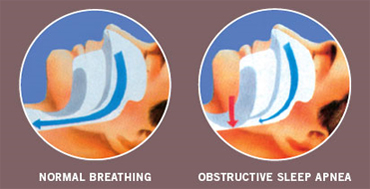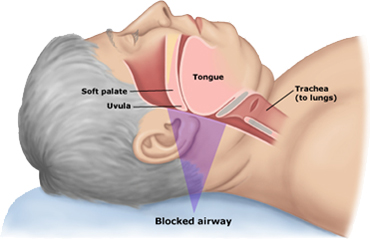Sleep Apnea
- What is Obstructive Sleep Apnea (OSA)?
- What are the effects of OSA?
- Do I have sleep apnea?
- How does Dr. Ram evaluate me for sleep apnea?
- What are the available treatments?
- What is a dental sleep device or oral appliance? Do I need one?
- What is combination therapy?
What is Obstructive Sleep Apnea (OSA)?
Sleep apnea is a very common sleep disorder. More than 18 million Americans suffer from the condition. Obstructive sleep apnea (OSA) is a sleep-related breathing disorder that prevents airflow during sleep. OSA occurs when the tissue in the back of the throat collapses and blocks the airway. This keeps air from getting into the lungs.
When the blood-oxygen level drops low enough, the body wakes up. It happens so quickly that the sleeper may not even remember the arousal. But waking up hundreds of times a night can make a person feel very tired the next day.


Blocked airway in Obstructive Sleep Apnea
What are the effects of OSA?
Apart from poor sleep quality OSA patients are much more likely to suffer from strokes and heart problems, such as heart attack, congestive heart failure, and hypertension. They also have a higher incidence of work and driving-related accidents.
Do I have sleep apnea?
OSA is most common in obese, middle-aged men. OSA risk increases with weight gain because excess fat in the back of the throat can narrow the airway. Women and men with OSA often have neck sizes of more than 16 or 17 inches, respectively. However, OSA can affect anyone.
Do you ever wake from sleep choking or gasping for breath? Has your bed partner noticed that you snore loudly or stop breathing during the night? Do you feel excessively tired during the day?
If yes, then you might have OSA.
How does Dr. Ram evaluate me for sleep apnea?
Obstructive sleep apnea is a medical condition and must be diagnosed by a Physician. Dr. Ram will see only those patients with OSA diagnosed by a physician and with a sleep study or polysomnogram (PSG). Dr. Ram will take a detailed history perform a clinical examination and evaluate your sleep study to determine if you may be a suitable candidate for the dental device.
What are the available treatments?
- Weight Loss
- Good sleep hygiene
- CPAP (Continuous Airway Pressure)
- Oral Appliance Therapy (Mild-Moderate OSA)
- Surgery
What is a dental sleep device or oral appliance? Do I need one?
Oral appliances are worn in the mouth to treat snoring and OSA. These devices are similar to orthodontic retainers or sports mouth guards. They maintain an opened, unobstructed airway. There are many different FDA-approved oral appliances available. Oral appliance therapy involves the selection, design, fitting and follow-up care of a custom-made oral appliance for sleep apnea treatment.
-
If you have moderate to severe OSA an initial trial with a nasal CPAP is necessary due to its greater effectiveness than an oral appliance.
- If you cannot tolerate or refuse to use your CPAP and with a release from your physician an oral appliance can be tried.
- Your oral appliance is a device that is worn in the mouth, similar to an orthodontic retainer or a sport mouthguard.
- The appliance tries to prevent collapse of your tongue and soft tissues in the back of the throat.
- The appliance attempts to keeps your airway open during sleep, promoting adequate air intake.
- There are 70 types of oral appliances available. There are basically two categories: Mandibular Repositioning Appliance (MRA) or Tongue Retained Appliances (TRA).

Modified Herbst Appliance (Mandibular advancement appliance)
What is combination therapy?
Oral appliances may be used alone or in combination with other sleep apnea therapies, including weight management, surgery or CPAP. This is usually reserved for selected cases of moderate to severe sleep apnea with a low tolerance to CPAP therapy.